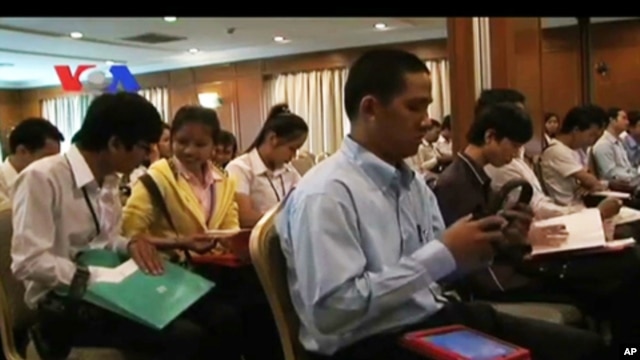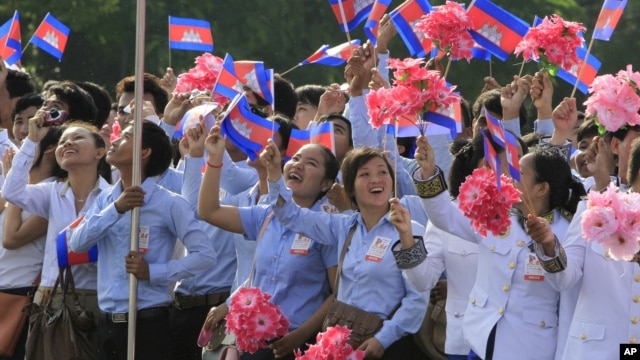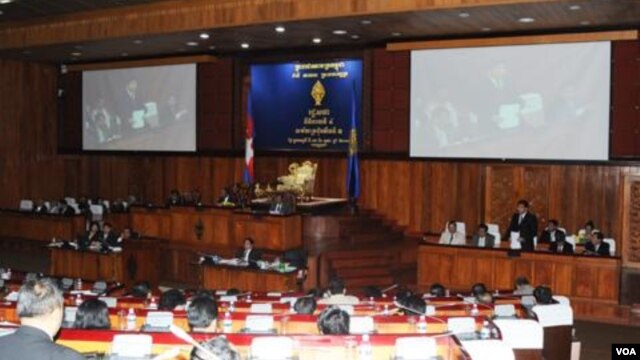
Cambodian National Rescue Party deputy president Kem Sokha addresses
supporters at Kampong Popil Poul commune in Prey Veng province’s Pea
Reang district in July 2012. Photograph: Heng Chivoan/Phnom Penh Post
Tuesday, 04 December 2012
David Boyle
The Phnom Penh Post
The Cambodian National Rescue Party is making a strategic shift in its
bid to win the next election: focusing less on traditional hot-button
issues like government corruption and territorial disputes, and instead
offering voters a series of concrete new policy initiatives.
The newly formed party plans to target six distinct areas where its lawmakers say CNRP-conducted studies have identified easy, viable improvements: agriculture, healthcare, employment, civil servant salaries, the minimum wage and pensions for the elderly.
One of the party’s key policymakers, current Sam Rainsy Party whip Son Chhay, said yesterday that the opposition had accepted that the electorate had become more focused on practical improvements to their living conditions rather than the grievances of the past.
“We have to become more mature in the way we take the issues to the public. We are transforming from just being the opposition; we are becoming a realistic choice of government,” he said.
This required clear and costed policies, three of which he had personally been tasked with formulating over the past three years, with one of the core targets being improvement to agricultural output and revenue distribution.
There would also be entrenched powers to negotiate, with Chhay identifying the monopoly the Federation of Cambodian Rice Millers holds on purchasing and setting prices for paddy as something that must be broken to drive higher prices for producers.
Pou Puy, president of the Cambodian Rice Millers Association, said he was too busy yesterday to comment.
Chhay’s studies had revealed Cambodia farmers paid two to three times more than neighbouring countries for inputs such as seed and fuel, he said, requiring government subsidies.
At the same time, farmers were paying about 30 per cent interest on loans because they were so small scale, a situation that need to be addressed with legislation that would create collective borrowing groups, legislation Chhay said he had drafted.
In a 2008 paper on the industry’s potential, Cambodia’s largest agricultural development NGO, the Centre d’Etude et de Développement Agricole Cambodgien, argued the Kingdom could become the second- or third-largest exporter of rice in the world if certain reforms were introduced.
There is now very limited capacity in Cambodia for large scale rice milling leading to large amounts in potential value-added revenue from paddy to spill over into neighbouring markets, which in some cases sell the end product back here.
Yields in Cambodia are also particularly low, at an average of somewhere just below or above 3 tonnes per hectare depending on the season.
If these problems and others are not addressed before the ASEAN Economic Community comes into effect in 2015, the country could expect an invasion of foreign investors in its agriculture sector, Chhay added.
This more proactive opposition strategy won support yesterday from figures on both sides of the aisle, though experts pointed out the first counter-attack the government would likely launch would be to ask how the CNRP thinks they will be able to finance their plans.
The CNRP is proposing a raft of taxes, including a $70 per hectare tax on economic land concessions expected to generate some $200 million and raising the tax to 50 per cent of net profit on the more than 50 casinos in Cambodia in hope of bringing in about $400 million.
The ruling Cambodian People’s Party, which in the past has borrowed about half the money required to finance its budgets, in general opposes the introduction of new taxes.
In a response to a written question from Son Chhay, senior CPP lawmaker Cheam Yeap, who could not be reached yesterday, did not address his proposed taxes but stated simply that the government had to continue to borrow money for the budget.
Minister of Commerce and Finance Cham Prasidh declined to comment yesterday; but Council of Ministers spokesman Phay Siphan said generally the government’s economic policy was aimed at attracting foreign investment.
“We have to give a good atmosphere and environment as well as [have] the laws to attract economic investment,” he said.
But Siphan welcomed the new strategy of the CNRP, affiliate parties of which have often run negative campaigns focused on past injustices and territorial disputes with Vietnam.
“Well, [it’s] very good news, as they have a change of strategy from a rebellious strategy to an opposition strategy in the context of democracy,” he said.
Carlyle Thayer, an emeritus professor of politics at the University of New South Wales and long-time critic of negative opposition campaigns, said the CNRP shift to concrete policies suggested “someone has done some very introspective thinking”.
“It’s a positive step forward; rather than playing the personality game, they need to be providing choices, but it will also take time to sink in and they [the electorate] need to not fear retribution to them or their families [if they vote against the CPP].”
Suggesting a tax on casinos was particularly clever, Thayer said, as they cater largely to rich foreigners and were perceived by most of the population as a domain of the elite.
“How will the CPP react if it [the CNRP] gains traction, that is the really good question,” he said, cautioning that this remains to be seen.
The newly formed party plans to target six distinct areas where its lawmakers say CNRP-conducted studies have identified easy, viable improvements: agriculture, healthcare, employment, civil servant salaries, the minimum wage and pensions for the elderly.
One of the party’s key policymakers, current Sam Rainsy Party whip Son Chhay, said yesterday that the opposition had accepted that the electorate had become more focused on practical improvements to their living conditions rather than the grievances of the past.
“We have to become more mature in the way we take the issues to the public. We are transforming from just being the opposition; we are becoming a realistic choice of government,” he said.
This required clear and costed policies, three of which he had personally been tasked with formulating over the past three years, with one of the core targets being improvement to agricultural output and revenue distribution.
There would also be entrenched powers to negotiate, with Chhay identifying the monopoly the Federation of Cambodian Rice Millers holds on purchasing and setting prices for paddy as something that must be broken to drive higher prices for producers.
Pou Puy, president of the Cambodian Rice Millers Association, said he was too busy yesterday to comment.
Chhay’s studies had revealed Cambodia farmers paid two to three times more than neighbouring countries for inputs such as seed and fuel, he said, requiring government subsidies.
At the same time, farmers were paying about 30 per cent interest on loans because they were so small scale, a situation that need to be addressed with legislation that would create collective borrowing groups, legislation Chhay said he had drafted.
In a 2008 paper on the industry’s potential, Cambodia’s largest agricultural development NGO, the Centre d’Etude et de Développement Agricole Cambodgien, argued the Kingdom could become the second- or third-largest exporter of rice in the world if certain reforms were introduced.
There is now very limited capacity in Cambodia for large scale rice milling leading to large amounts in potential value-added revenue from paddy to spill over into neighbouring markets, which in some cases sell the end product back here.
Yields in Cambodia are also particularly low, at an average of somewhere just below or above 3 tonnes per hectare depending on the season.
If these problems and others are not addressed before the ASEAN Economic Community comes into effect in 2015, the country could expect an invasion of foreign investors in its agriculture sector, Chhay added.
This more proactive opposition strategy won support yesterday from figures on both sides of the aisle, though experts pointed out the first counter-attack the government would likely launch would be to ask how the CNRP thinks they will be able to finance their plans.
The CNRP is proposing a raft of taxes, including a $70 per hectare tax on economic land concessions expected to generate some $200 million and raising the tax to 50 per cent of net profit on the more than 50 casinos in Cambodia in hope of bringing in about $400 million.
The ruling Cambodian People’s Party, which in the past has borrowed about half the money required to finance its budgets, in general opposes the introduction of new taxes.
In a response to a written question from Son Chhay, senior CPP lawmaker Cheam Yeap, who could not be reached yesterday, did not address his proposed taxes but stated simply that the government had to continue to borrow money for the budget.
Minister of Commerce and Finance Cham Prasidh declined to comment yesterday; but Council of Ministers spokesman Phay Siphan said generally the government’s economic policy was aimed at attracting foreign investment.
“We have to give a good atmosphere and environment as well as [have] the laws to attract economic investment,” he said.
But Siphan welcomed the new strategy of the CNRP, affiliate parties of which have often run negative campaigns focused on past injustices and territorial disputes with Vietnam.
“Well, [it’s] very good news, as they have a change of strategy from a rebellious strategy to an opposition strategy in the context of democracy,” he said.
Carlyle Thayer, an emeritus professor of politics at the University of New South Wales and long-time critic of negative opposition campaigns, said the CNRP shift to concrete policies suggested “someone has done some very introspective thinking”.
“It’s a positive step forward; rather than playing the personality game, they need to be providing choices, but it will also take time to sink in and they [the electorate] need to not fear retribution to them or their families [if they vote against the CPP].”
Suggesting a tax on casinos was particularly clever, Thayer said, as they cater largely to rich foreigners and were perceived by most of the population as a domain of the elite.
“How will the CPP react if it [the CNRP] gains traction, that is the really good question,” he said, cautioning that this remains to be seen.







